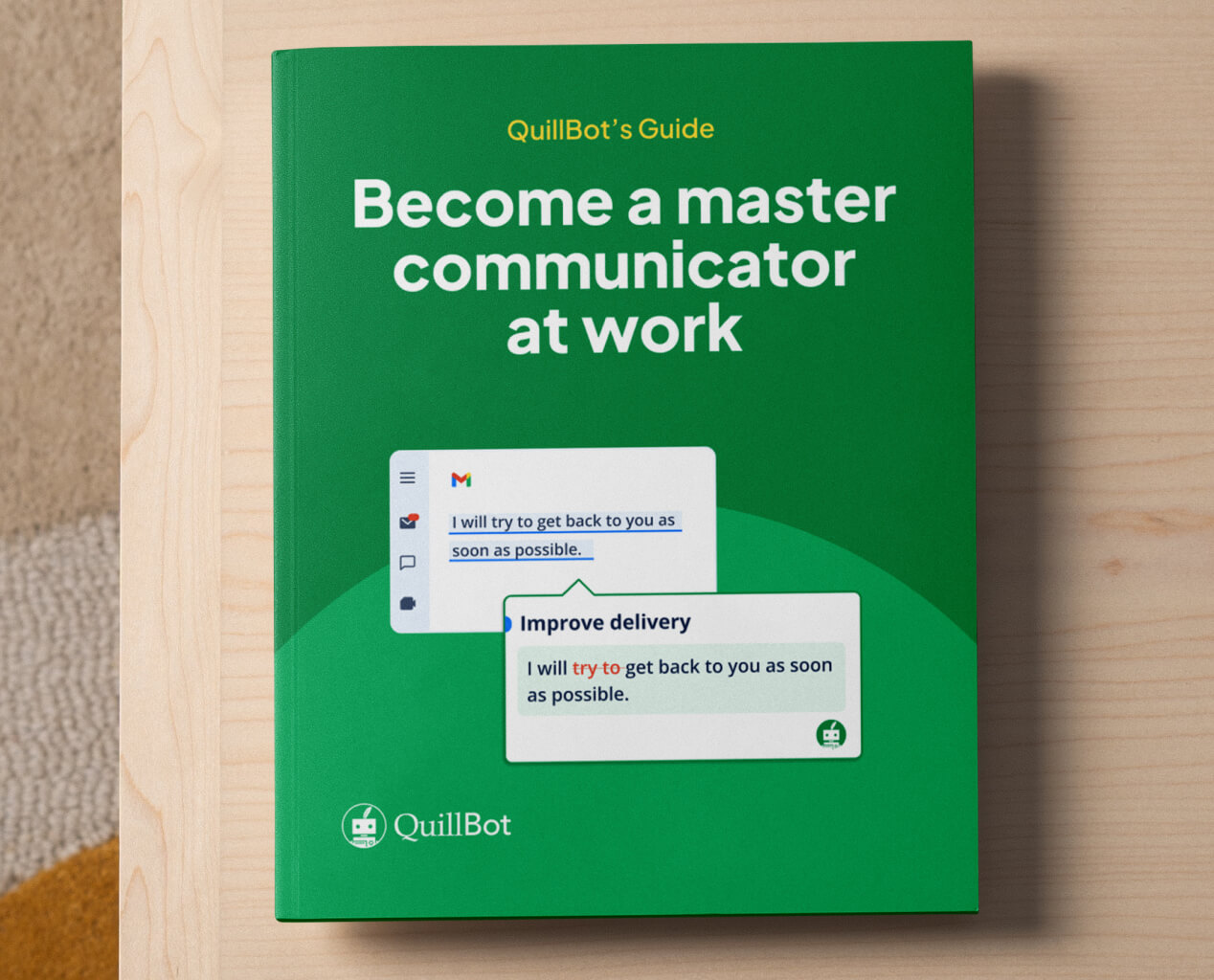Antonyms | Meaning, Types & Examples
Antonyms are words that have opposite meanings. They can be almost all parts of speech: nouns, verbs, adjectives, adverbs, and prepositions.
Beautiful / ugly
Protagonist / antagonist
Antonyms are one tool you can use to make your writing richer. For antonyms for a specific word, ask QuillBot’s AI Chat.
What are antonyms?
Antonyms are words that are opposite in meaning to another word in the same language. For example, “always” and “never” are adverbs of frequency that are antonyms of each other; “always” suggests 100% frequency, and “never” suggests 0% frequency.
Antonyms serve various purposes in writing. They can add nuance to your descriptions. For example, choosing to say that someone is “not polite” has a softer connotation than labeling them as “rude” outright. Antonyms can also make your descriptions more vivid and help defy readers’ expectations, like if you say “a warm winter morning.”
You may also find antonyms useful if using antithesis, a literary device that places two contrasting ideas in a balanced structure to highlight key differences. An example of this is the line “My only love sprung from my only hate” from Romeo and Juliet by William Shakespeare. Shakespeare creates a memorable moment by contrasting the concepts of “love” and “hate.”
Synonyms and antonyms
Synonyms and antonyms are often discussed together. While antonyms are words that have opposite meanings, synonyms are words that have the same or similar meanings.
Both words come from the Greek root -onym [name]. “Antonym” adds the prefix anti- [opposite] and therefore means “opposite name.” “Synonym” uses syn- [same], thus meaning “same name.”
- Synonyms include “role model,” “idol,” and “champion.”
- Antonyms include “villain,” “traitor,” and “coward.”
Prefixes commonly used in antonyms
English antonyms are often formed with negative prefixes to create the opposite of another word. For example, if you add the prefix “dis-” to the word “honest,” you get “dishonest,” its antonym.
| Prefix | Original word example | Antonym with prefix example |
|---|---|---|
| a- | Moral | Amoral |
| counter- | Clockwise | Counterclockwise |
| dis- | Agree | Disagree |
| il- | Legal | Illegal |
| in- | Active | Inactive |
| im- | Polite | Impolite |
| ir- | Responsible | Irresponsible |
| mal- | Function | Malfunction |
| mis- | Interpret | Misinterpret |
| non- | Fiction | Nonfiction |
| un- | Available | Unavailable |
Types of antonyms
There are four main types of antonyms, each with a slightly different way of expressing opposition in meaning.
1. Complementary
Complementary antonyms (also called “direct,” “contradictory,” or “binary”) are pairs of words where the presence of one automatically implies the absence of the other. Complementary antonyms represent an either/or relationship; in other words, something must be one or the other but can never be both.
Absent/present
On/off
2. Relational
Relational antonyms (also called “converse”) describe a relationship from opposite perspectives. One implies the other, but from a different viewpoint. The antonyms can’t exist without each other, but the roles they communicate are different.
Buy/sell
Parent/child
3. Gradable
Gradable antonyms (also called “polar”) exist on a spectrum or scale, where the presence of one quality implies the lesser presence of the other, rather than an absolute opposite. They can be modified by adverbs of degree. Gradable antonyms are relative; an elephant is “big” in comparison to a mouse but “small” when compared to a blue whale.
Cheap/expensive
Happy/sad
4. Contronyms
Contronyms (also called “auto-antonyms” or “Janus words”) are words that have two contradictory meanings that function as antonyms. To know which meaning of a contronym is intended in a given sentence, you have to use context clues.
| Contronym | Meaning one | Meaning two |
|---|---|---|
| Bolt | To secure something
(e.g., “bolt the door”) |
To run away quickly
(e.g., “bolt for the door”) |
| Dust | To add small particles
(e.g., “dust the cake with sugar”) |
To remove small particles
(e.g., “dust the house”) |
| Fine | Excellent
(e.g., “fine wine”) |
Acceptable
(e.g., “fine, but not great”) |
| Left | Gone
(e.g., “they left an hour ago) |
Remaining
(e.g., “only two people are left”) |
| Original | First or earliest
(e.g., “the original building”) |
New and inventive
(e.g., “an original idea”) |
| Sanction | To authorize or approve
(e.g., “the court sanctions the law”) |
To penalize
(e.g., “sanction a hostile country”) |
| Screen | To show
(e.g., “screen a movie”) |
To hide
(e.g., “her hair screened her face”) |
| Weather | To endure or survive
(e.g., “they weathered the winter”) |
To wear away
(e.g., “waves weathered the rock”) |
Antonyms examples
Below find some more examples of antonyms organized by part of speech.
| Part of speech | Antonyms | Example sentence(s) |
|---|---|---|
| Adjectives | Better/worse | I thought this movie was better than the first part, but Tom thought it was worse. |
| Big/small | Take the big umbrella, not the small one. | |
| Eldest/youngest | Both the eldest and youngest daughters are blondes, while the middle one is a brunette. | |
| Fair/unfair | Some will think the new policy is fair, and others will deem it unfair. | |
| Hot/cold | The coffee was too hot to drink, but the juice was cold and refreshing. | |
| Subjective/objective | We must base experiments on objective data, not subjective impressions. | |
| Young/old | The young tree grew beside an old stone wall. | |
| Nouns | Compliment/insult | She meant it as a compliment, but he took it as an insult. |
| Day/night | The city looks completely different by day and by night. | |
| Friend/enemy | He treated everyone as a friend, not an enemy. | |
| Peace/war | The treaty brought lasting peace after years of war. | |
| Success/failure | Every success teaches less than a single failure. | |
| Victory/defeat | The team celebrated their victory and learned from their defeat. | |
| Verbs | Accept/reject | Paula got accepted to Yale but rejected by Harvard. |
| Arrive/depart | The train will arrive at noon and depart ten minutes later. | |
| Build/destroy | It takes years to build trust and seconds to destroy it. | |
| Give/take | When someone gives you a gift, you should take it politely. | |
| Open/close | Open the door, but close the window. | |
| Win / lose | You win some, you lose some. | |
| Adverbs | Accidentally/intentionally | Laura hit you accidentally, not intentionally. |
| Boldly/meekly | Nicholas boldly asked for another cookie, while Louis asked meekly. | |
| Early/late | I prefer to stay up late rather than wake up early. | |
| Gently/roughly | We have to pet the kitten gently, not roughly. | |
| Gradually/suddenly | The car gradually slowed down and then suddenly sped up again. | |
| Here/there | Let’s stop here first, and then we’ll go there later. | |
| Quickly/slowly | The hare ran quickly, while the tortoise walked slowly. | |
| Prepositions | Above/below | Let’s hang the painting above the shelf and place the plant below it. |
| Before/after | Wash your hands before eating and again after. | |
| In/out | They’ve been coming in and out of the office all day. | |
| Over/under | The bridge goes over the river, and the tunnel goes under it. |
- And/but: “And” connects similar or additive ideas, while “but” introduces contrast.
- Despite/because: “Because” shows cause and result, but “despite” introduces a contrast or concession.
- This/that: These words contrast proximity.
- Everyone/no one: These indefinite pronouns refer to “all” or “no” people.
Frequently asked questions about antonyms
Cite this Quillbot article
We encourage the use of reliable sources in all types of writing. You can copy and paste the citation or click the "Cite this article" button to automatically add it to our free Citation Generator.
Santoro, K. (2025, October 23). Antonyms | Meaning, Types & Examples. Quillbot. Retrieved January 26, 2026, from https://quillbot.com/blog/synonyms/antonyms/

